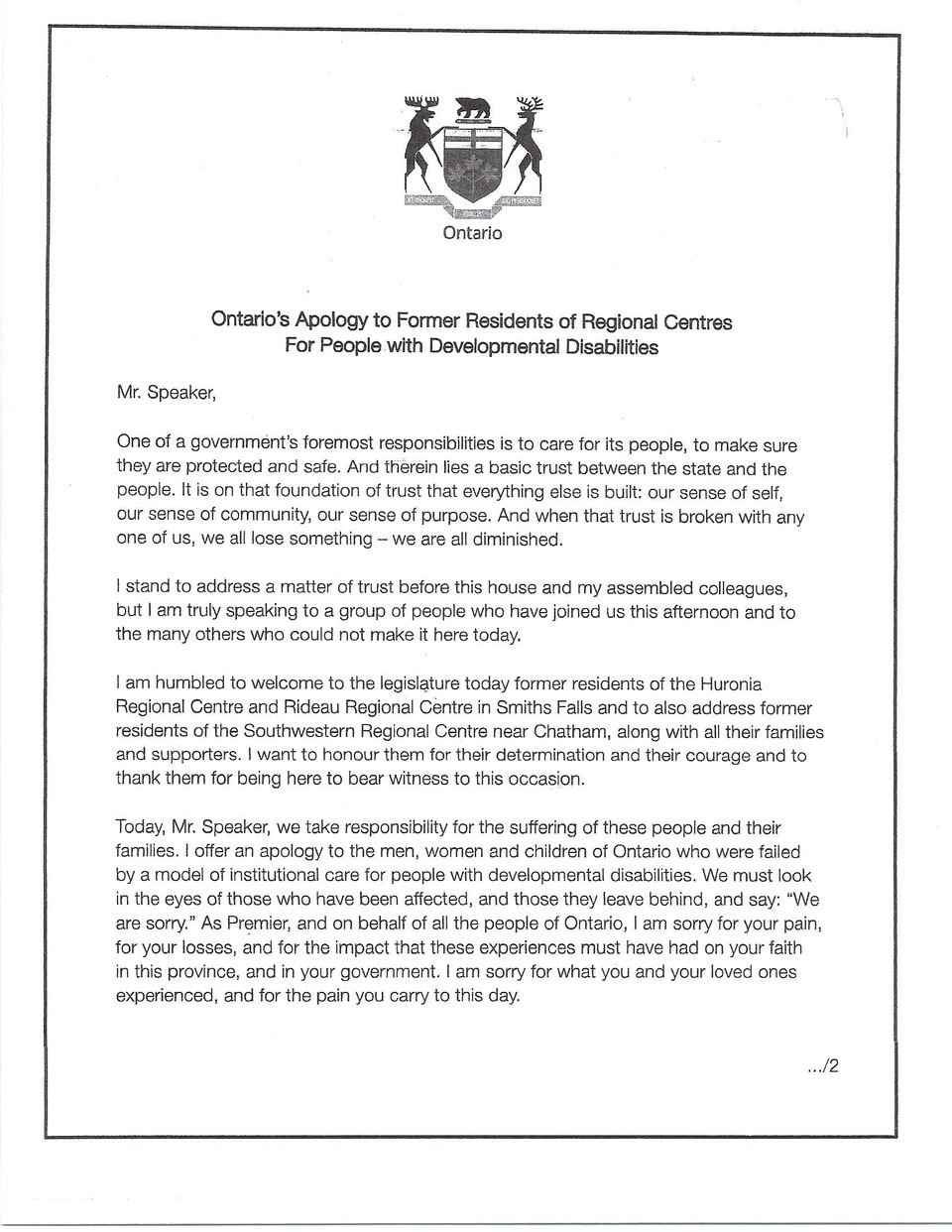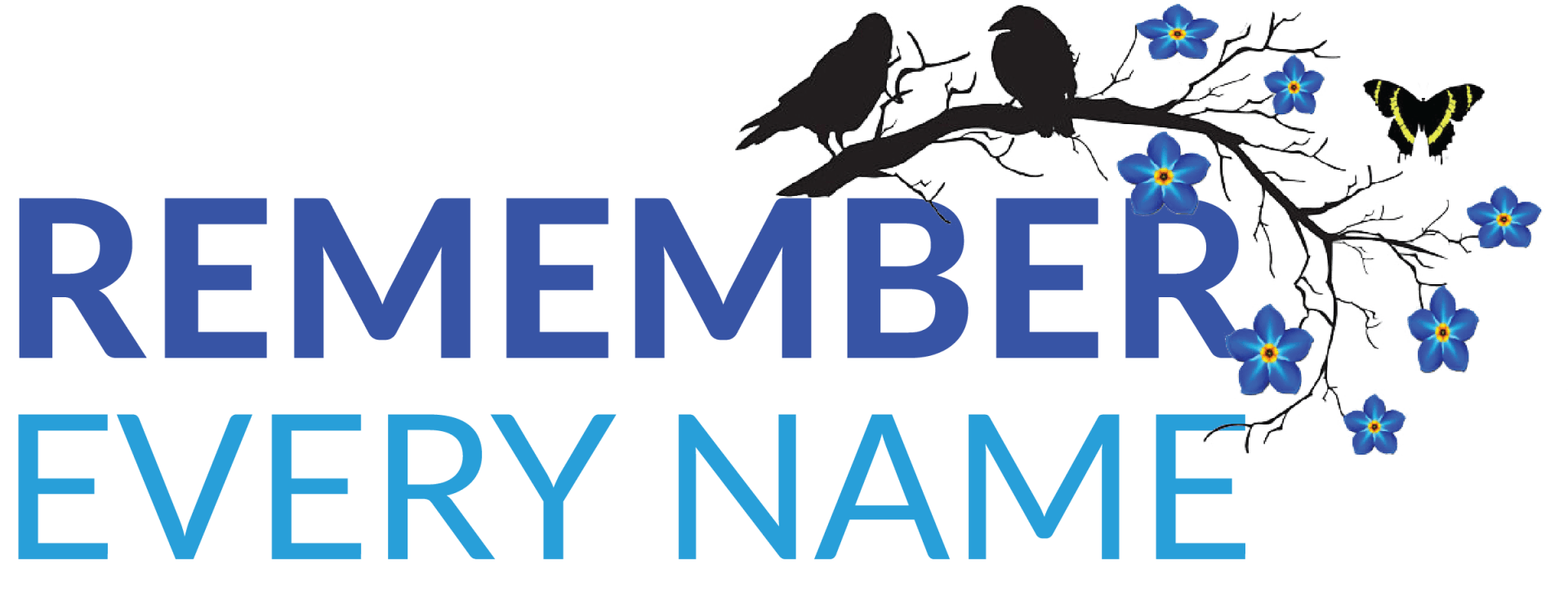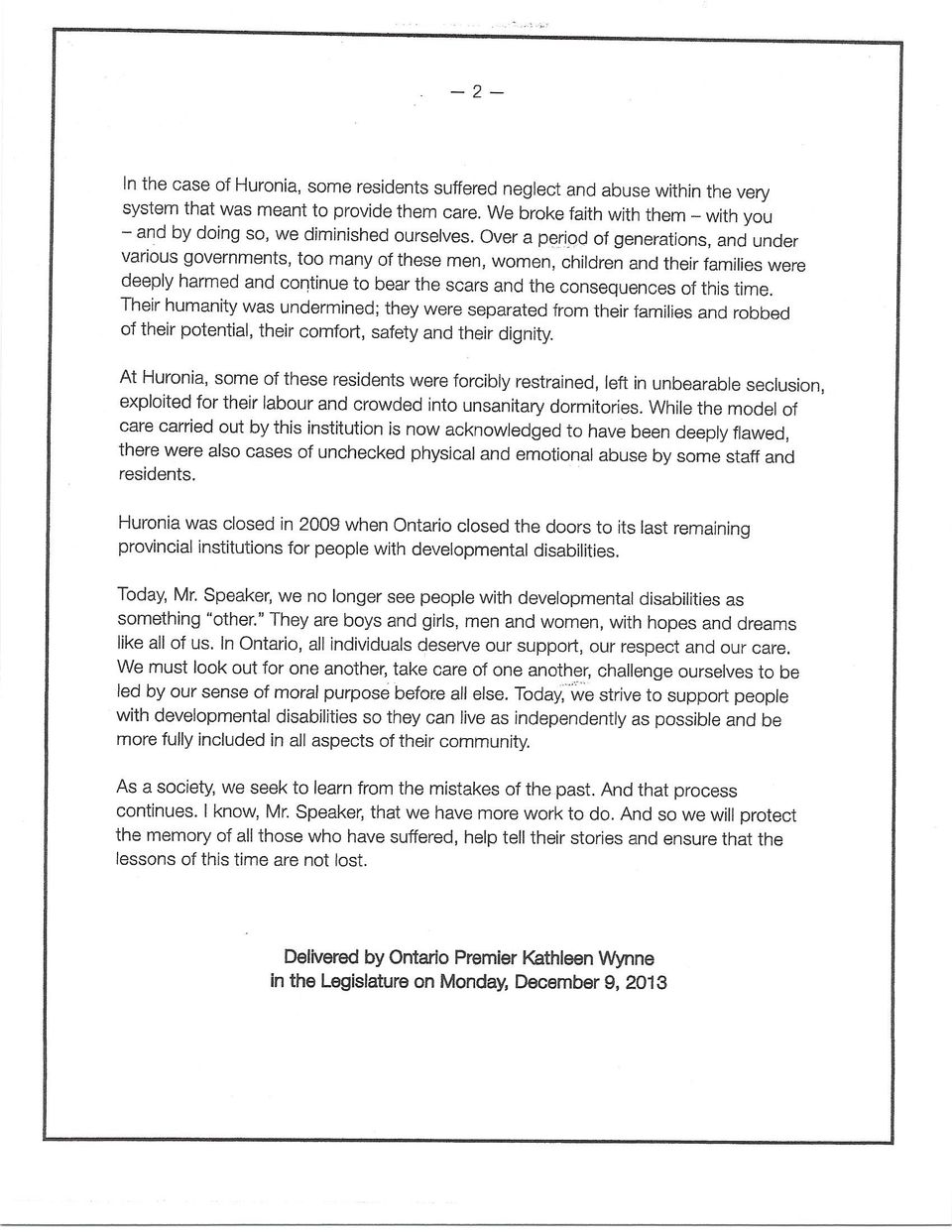Ontario's Apology
Ontario's Apology to Former Residents of Regional Centres For People with Developmental Disabilities

December 9, 2013 - Transcript
Hon. Kathleen O. Wynne: Good afternoon, everyone. It is not lost on me that this afternoon we are doing two very connected things. We are—I am—here to speak truth about a painful chapter in our history and to seek reconciliation with all of those who have been harmed. We will then pay tribute to a man who embodied the power of truth and reconciliation, so I draw on that strength as I offer this apology.
A government’s responsibility is to care for its people and to make sure they are protected and safe, and therein lies a basic trust between the state and the people. It is on that foundation of trust that everything else is built: our sense of self, our sense of community, our sense of purpose. When that trust is broken with any one of us, we all lose something; we are all diminished.
I want to address a matter of trust before this House and my assembled colleagues, but I am truly speaking to a group of people who have joined us this afternoon and to the many others who could not be here today. I am humbled to welcome to the Legislature today former residents of the Huronia Regional Centre; and the Rideau Regional Centre, in Smiths Falls; and also to address former residents of the Southwestern Regional Centre, near Chatham, along with their families and supporters. I want to welcome all of you, I want to honour your determination and your courage, and I want to thank you for being here to bear witness to this occasion.
Today we take responsibility for the suffering of these people and their families.
Aujourd’hui, nous assumons la responsabilité des souffrances subies par ces personnes et les membres de leur famille.
I offer an apology to the men, women and children of Ontario who were failed by a model of institutional care for people with developmental disabilities. We must look in the eyes of those who have been affected and those they leave behind and say we are sorry.
As Premier and on behalf of all the people of Ontario, I am sorry for your pain, for your losses and for the impact these experiences must have had on your faith in this province and in your government. I am sorry for what you and your loved ones experienced and for the pain that you carry to this day.
À titre de première ministre et au nom de l’ensemble de la population de l’Ontario, je suis désolée des peines, des pertes et de toutes les répercussions que vous avez subies et qui ont miné votre confiance dans la province et dans le gouvernement. Je suis désolée de ce que vous et vos êtres chers avez dû vivre, de même que pour la peine que vous avez endurée jusqu’à ce jour.
In the case of Huronia, some residents suffered neglect and abuse within the very system that was meant to provide them care
We broke faith with them and with you, and by doing so, we diminished ourselves. Over a period of generations and under various governments, too many of these men, women and children and their families were deeply harmed, and they continue to bear the scars and the consequences of this time. Their humanity was undermined. They were separated from their families and robbed of their potential, their comfort, their safety and their dignity. At Huronia, some of these residents were forcibly restrained, left in unbearable seclusion, exploited for their labour and crowded into unsanitary conditions. While the model of care carried out by this institution is now acknowledged to have been deeply flawed, there were also cases of unchecked physical and emotional abuse by some staff and residents.
Huronia was closed in 2009, when Ontario closed the doors to its last remaining provincial institutions for people with developmental disabilities. Today, Mr. Speaker, we no longer see people with developmental disabilities as something other; they are boys and girls, men and women with hopes and dreams, like everyone else. In Ontario, all individuals deserve our support, our respect and our care. We must look out for one another, take care of one another and challenge ourselves to be led by our sense of moral purpose before all else.
Today, we strive to support people with developmental disabilities so they can live as independently as possible and be more fully included in all aspects of their community. As a society, we seek to learn from the mistakes of the past, and that process continues.
I know, Mr. Speaker, that we have more to do, so we will protect the memory of all those who have suffered, help to tell their stories, and ensure that the lessons of this time are not lost.
We are so sorry.
Mr. Tim Hudak: I’m going to split my time with my colleague the member from Simcoe North, who has spoken about Huronia on many occasions here in the Ontario Legislature.
I’m a proud Ontarian. I love my province dearly. There’s no place I’d rather be or be from. But we have a very sad chapter in our history that demands an apology. When we do wrong, we need to speak to it plainly and honestly.
Compassion has always been part of what defines Ontario. It’s part of our character. The duty to support our most vulnerable is our government’s most important responsibility—to protect those who cannot protect themselves. When we fail that, we fail all Ontarians, and there is never an excuse.
As a province and as a government, we failed the children of the Huronia Regional Centre. These developmentally disabled boys and girls, men and women looked to us, as caretakers and as leaders, to be there for them, their protectors; instead, horrific stories of systemic neglect, physical, emotional and sexual abuse. To abuse that trust and then to abuse the innocent lives is atrocious and inexcusable. It’s flesh and blood, brothers and sisters, nieces and nephews, sons and daughters. For too long, these boys, girls, men and women were out of sight, out of mind, the burden of that experience entirely on their shoulders and that incredible weight on the backs of their parents and families.
It’s truly unfortunate it took so long to get to this day, but we all owe an incredible debt of gratitude to those who fought to get us here, many of those in the gallery here today on this historic day.
1450
I want to offer my thanks to Marilyn and Jim Dolmage, Patricia Seth and Marie Slark for their inspiring bravery and incredible tenacity. You gave a face to the cause, a voice to those who could not speak up for themselves, and a peace to those who cannot join us here today.
We stand here today collectively and apologize to the families, the boys and girls, the men and women. We are truly, truly sorry. Our apologies will never erase the pain or the tragedy. There’s nothing, sadly, that we can do to take away the memories, to bring people back. But we must remember, and let us never forget this day, so that we never see it repeated again in the province of Ontario.
Mr. Garfield Dunlop: As the MPP for the area where the Huronia Regional Centre was located, I’m pleased to be here today. I want to thank the Premier for the apology and I want to thank the kind words of our leader, Tim Hudak.
I know that with the closure of the Huronia Regional Centre, a lot of pressure was put on the Community Living organizations across our province, and when we’re dealing with people with exceptionalities, I want to thank Community Living Huronia and Simcoe services in particular, the two major community living organizations in Simcoe county.
But I can tell you, the Premier did say—she said it right up front—we still have a lot to do. There are two things I hope that we can all, as MPPs, and I hope we can all, as community leaders, work on. One of them, of course, is some of the cases with how the police handle people with exceptionalities in extreme cases. I think there has already been some retraining done in that area, because we’ve had some pretty sad stories in that particular area.
The other one that I really hope we can zero in on is the people, the men and women who have raised their children; they were people born with exceptionalities, and they’ve raised them to adult ages, and now the people are at—they’re old people. Some of them have very feeble health. They’re having a very, very difficult time finding the services in our province to handle them. I hear it continually in my area, and I hope that that’s something that we can say to any government, whether it’s past or present or future, I should say, that we have to deal with that as well, because there is definitely an area of concern that we have to take care for people, as our leader has said.
Thank you very much, Mr. Speaker, and again, thank you, Premier, for bringing this. It’s a sign of leadership, both from my leader as well, to bring this apology today.
Ms. Andrea Horwath: The victims, the women and men, girls and boys, who suffered abuse at the Huronia Regional Centre have waited a long time to hear two words from the Premier of Ontario: “I’m sorry.” And it’s important to understand why this apology could only be morally legitimate if it came from the first minister and not a member of cabinet. The survivors are citizens of Ontario, not wards of the province, not clients of the Ministry of Community and Social Services, and not simply claimants in a legal action against the Attorney General. They are citizens.
The courts have ruled that these citizens were neglected by our province when it had a duty of care, and the settlement mandated an apology. But it was always up to the Premier to dignify that apology. It’s up to the current Premier to speak on behalf of all previous Premiers and to speak through the highest office of our province’s democratic institution. This apology is an admission of wrongdoing, but it should also be a pledge that our province will never allow such neglect, such abuse, such a betrayal of our most vulnerable citizens, to ever happen again.
Ces excuses ne peuvent pas effacer le passé. Mais elles peuvent permettre aux survivants du Centre régional de la Huronie et à leur famille de retrouver un peu de paix afin de pouvoir aller de l’avant.
Sadly, many of the victims did not live to see this day, and many who wanted to be here in person could not attend because this event was scheduled at somewhat short notice, even after decades of delay. Hundreds are watching from home across this province, and some survivors and their families, friends and supporters travelled across winter roads to get to the Legislature this afternoon.
I hope they can take some solace in this apology, and I hope that the Premier will back up her words with actions. She must immediately clear away the roadblocks preventing survivors and their families from accessing their files. Sixty-five thousand pages of documents are owed to the survivors of the Huronia Regional Centre. Survivors should not have to file freedom of information requests to access their files. They should not incur any undue financial costs after all they have been through.
It’s not enough for the government to say that the files are lost or that the files are inaccessible. The Huronia Regional Centre survivors and families have waited long enough. The government must not diminish an apology with excuses. It must do whatever it takes to get the survivors the information they deserve. We cannot close this dark chapter in Ontario’s history until all of the survivors and all of their families are contacted, compensated and fully informed.
So let’s leave this historic moment of apology, which the Premier did very well in delivering, with open hearts. In fact, let’s make it open our hearts. Let’s learn from the past—absolutely—and let’s make sure that forevermore the province of Ontario looks after all of its citizens.
Applause.

